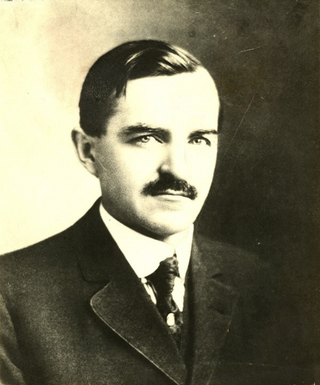
The Republican Party, retroactively called the Democratic-Republican Party, and also referred to as the Jeffersonian Republican Party among other names, was an American political party founded by Thomas Jefferson and James Madison in the early 1790s that championed liberalism, republicanism, individual liberty, equal rights, decentralization, free markets, free trade, agrarianism, and sympathy with the French Revolution. The party became increasingly dominant after the 1800 elections as the opposing Federalist Party collapsed.
Primary elections, or direct primary are voting processes by which voters can indicate their preference for their party's candidate, or a candidate in general, in an upcoming general election, local election, or by-election. Depending on the country and administrative divisions within the country, voters might consist of the general public in what is called an open primary, or solely the members of a political party in what is called a closed primary. In addition to these, there are other variants on primaries that are used by many countries holding elections throughout the world.
American electoral politics have been dominated by successive pairs of major political parties since shortly after the founding of the republic of the United States. Since the 1850s, the two largest political parties have been the Democratic Party and the Republican Party—which together have won every United States presidential election since 1852 and controlled the United States Congress since at least 1856. Despite keeping the same names, the two parties have evolved in terms of ideologies, positions, and support bases over their long lifespans, in response to social, cultural, and economic developments—the Democratic Party being the left-of-center party since the time of the New Deal, and the Republican Party now being the right-of-center party.

The Nonpartisan League (NPL) was a left-wing political party founded in 1915 in North Dakota by Arthur C. Townley, a former organizer for the Socialist Party of America. On behalf of small farmers and merchants, the Nonpartisan League advocated state control of mills, grain elevators, banks, and other farm-related industries in order to reduce the power of corporate and political interests from Minneapolis and Chicago.
Nonpartisan democracy is a system of representative government or organization such that universal and periodic elections take place without reference to political parties. Sometimes electioneering and even speaking about candidates may be discouraged, so as not to prejudice others' decisions or create a contentious atmosphere.
The North Dakota Democratic–Nonpartisan League Party is the North Dakota affiliate of the national Democratic Party. It was formed as the outcome of a merger of two parties; the state previously had a three-party political system. It is one of only two state Democratic Party affiliates to have a different name from the central party, the other being the neighboring Minnesota Democratic–Farmer–Labor Party. The party currently has very weak electoral power in the state, controlling none of North Dakota's statewide or federal elected offices.
Democrat Party is an epithet and pejorative for the Democratic Party of the United States, often used in a disparaging fashion by the party's opponents. While use of the term started out as non-hostile, it has grown in its negative use since the 1940s, in particular by members of the Republican Party—in party platforms, partisan speeches, and press releases—as well as by conservative commentators and third party politicians.

Daniel Webster Hoan was an American politician who served as the 32nd Mayor of Milwaukee, Wisconsin from 1916 to 1940. A lawyer who had served as Milwaukee City Attorney from 1910 to 1916, Hoan was a prominent figure in Socialist politics and Milwaukee's second Socialist mayor. His 24-year administration remains the longest continuous Socialist administration in United States history. A panel of 69 scholars in 1993 ranked him among the ten best mayors in American history.
A nonpartisan blanket primary is a primary election in which all candidates for the same elected office run against each other at once, regardless of the political party. Partisan elections are, on the other hand, segregated by political party. Nonpartisan blanket primaries are slightly different from most other elections systems with two rounds/a runoff, also known as "jungle primaries" , in a few ways. The first round of a nonpartisan blanket primary is officially the "primary." Round two is the "general election." Round two must be held, even if one candidate receives a majority in the first round.
The Democratic Party of Wisconsin is the affiliate of the Democratic Party in the U.S. state of Wisconsin. It is currently headed by chair Ben Wikler.
Sewer socialism was an originally pejorative term for the American socialist movement that centered in Milwaukee, Wisconsin, from around 1892 to 1960. The term was coined by Morris Hillquit at the 1932 Milwaukee convention of the Socialist Party of America as a commentary on the Milwaukee socialists and their perpetual boasting about the excellent public sewer system in the city.
"Wingnut", wing nut or wing-nut, is a pejorative American political term referring to a person who holds extreme, and often irrational, political views. It is a reference to the extreme "wings" of a party, and shares a name with the hardware fastener also known as a wingnut.

The municipal government of the U.S. city of Milwaukee, located in the state of Wisconsin, consists of a mayor and common council. Traditionally supporting liberal politicians and movements, this community has consistently proved to be a stronghold of the Democratic Party. As the largest city in Wisconsin, Milwaukee receives a significant amount of attention during elections.
Labor Party was the name or partial name of a number of United States political parties which were organized during the 1870s and 1880s.
Nonpartisanism in the United States is organized under United States Internal Revenue Code that qualifies certain non-profit organizations for tax-exempt status because they refrain from engaging in certain political activities prohibited for them. The designation "nonpartisan" usually reflects a claim made by organizations about themselves, or by commentators, and not an official category per American law. Rather, certain types of nonprofit organizations are under varying requirements to refrain from election-related political activities, or may be taxed to the extent they engage in electoral politics, so the word affirms a legal requirement. In this context, "nonpartisan" means that the organization, by US tax law, is prohibited from supporting or opposing political candidates, parties, and in some cases other votes like propositions, directly or indirectly, but does not mean that the organization cannot take positions on political issues.
This is a list of persons who have served as members of U.S. state legislatures while enrolled in third parties. For purposes of this list, a third party is defined as any party other than the Democratic Party or the Republican Party. This list spans the period from 1856 to the present. The time period listed beside each elected official's name is the time period when that elected official has served as a state legislator while enrolled as a member of a third party. State legislators who are independent are not included in this list.

Justice Democrats is an American progressive political action committee and caucus founded on January 23, 2017, by two leaders of Bernie Sanders's 2016 presidential campaign, Saikat Chakrabarti and Zack Exley, as well as political commentators Kyle Kulinski and Cenk Uygur of The Young Turks. The organization formed as a result of the 2016 United States presidential election and aspires "to elect a new type of Democratic majority in Congress" that will "create a thriving economy and democracy that works for the people, not big money interests". The group advocates for campaign finance reform and endorses only candidates who pledge to refuse donations from corporate PACs and lobbyists.

The 1922 Wisconsin gubernatorial election was held on November 7, 1922.

The 1913 Pittsburgh mayoral election was held on Tuesday, November 4, 1913, in Pittsburgh, Pennsylvania. Joseph G. Armstrong was elected mayor of Pittsburgh over Stephen G. Porter in a nonpartisan election.

Beginning shortly after the city's incorporation as a city in 1846, elections have been held in the mayor of Manchester, New Hampshire. The following article provides information on the elections for mayor in the city during the 21st century.







